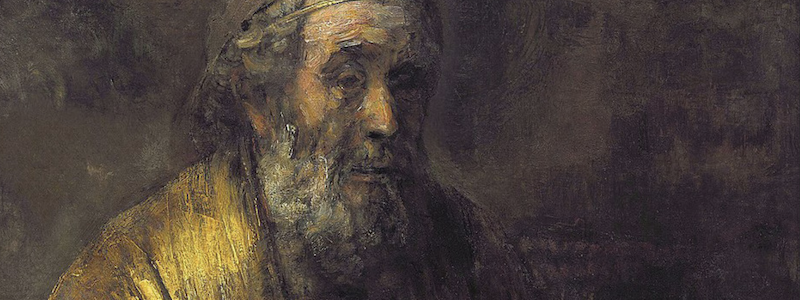The Homeric Question

Homer Dictating his Verses by Rembrandt (1663).
Homer is undoubtedly the most well-known author from Ancient Greece. At the same time, he also remains one of the most mysterious authors of modern scholasticism. Partly, this is due to the substantial distance between our modern times and when he wrote. This distance has created a question of authorship, notoriously known as “the Homeric question.” We do not know who, truthfully, wrote The lliad and The Odyssey: it may have been a group of poets, a poor and blind nomad, a woman, an aristocrat, anyone—we simply do not have the information to make a solid claim. However, we can make hypotheses, use our imagination, and perform some impressive detective work to make a best guess—that is to say, to do what classical historians do. If (and what a big “if” that is!) Homer were to exist as a single person, we would be able to use historical records, archaeology, and geographical evidence to make educated claims about what type of person he would be.
Currently, it is thought that Homer must have composed his famous poems sometime in the eighth century BCE. The epic style of the poems hints that they would have needed to be composed sometime after 750 BCE, when Pan-Hellenic festivals celebrating poetry became popular. If this were the case, Homer would have been traveling through the larger Greece, delivering his poems to adoring and upper class fans. While this is our best guess based on archaeology, one cannot ignore the fact that ancient authors dated Homer much earlier than this relatively late date. Herodotus claimed that Homer lived 400 years before he did, dating Homer to around 850 BCE. Other ancient authors claimed that Homer must have existed even closer to the Trojan War, sometime around 1200 BCE. Thus, it appears that there is a five hundred-year span of when Homer may have lived, with a larger likelihood on the later dates.
The next unsolved mystery is determining where Homer would have lived. Much of the geology and
flora described in The lliad would make it seem that Homer had intimate knowledge of lonia (roughly
modern-day Türkiye). This would seem to place him somewhere where Ancient Troy would have been. However, Homer also illustrates a great deal of knowledge of island geography in his Odyssey, which would support the fact that he spent much time on various Greek isles. Many of the cities existing in Attica (the area around Athens) and even Laconia (Greece’s Southern Peninsula) made claims that Homer rested in their town while composing his epic, which provides evidence (albeit weak) that Homer may have actually been a wandering poet traveling throughout Greece. These records are probably false, however—created by towns wanting to attract tourism and fame. Who wouldn’t want to spend a night in the same town as history’s greatest poet? Despite nomadic legends, it is important to note that Homer’s dialect was Ancient lonic Greek, making the case, once again, for his more eastern roots.
Why does there exist this idea of Homer as a “blind poet”? Most likely, it derives from his name “Όμηρος,” which in Ancient Greek roughly translates to “follower.” In the Eastern dialect of Greek, however, this word takes on the second and literal meaning, “blind.” Additionally, much has been written about the blind poet, Demodocus— appearing in book eight of The Odyssey—who recounts the story of the Trojan War to a disguised Odysseus. This has been described as a self-referential moment in the story where Homer illustrates the power and importance of epic poetry as a tool for recording history and catharsis. This theory is acceptable, but must be taken with a grain of salt: not all great authors intentionally write themselves into their stories. In general, modern scholars have no reason to think Homer was blind, especially since his poems include such strikingly visual descriptions. If anything, Homer’s “blindness” is another fiction we recount in order to maintain a mystery around the masterworks he created.
While these are some of the knowns and unknowns of this ancient author, one is forced to acknowledge a very simple fact: our knowledge of the ancient world is incomplete. Indeed, it is very likely that Homer is a fictive personage created by stringing together dozens of ancient poets’ renditions of war stories. We are so distanced from Homer’s time that we will probably never know for sure whether he actually existed. However, one may look at the evidence we have so far and make the case that his poetry does seem to come from a common experience, from a common culture, and from a common style. It is for this reason that one should have no qualms stating that Homer, either the person or the idea, remains one of the most masterful authors standing the tests of time.
This article was edited and reproduced from the 2011 program of An Iliad.